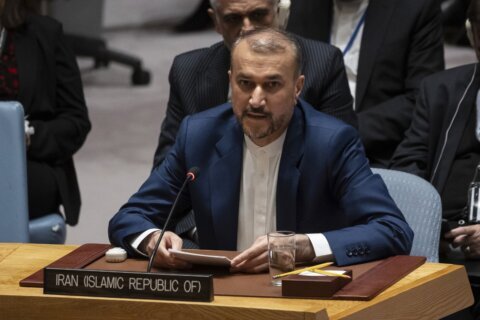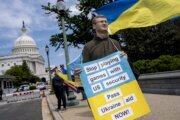KHARTOUM, Sudan (AP) — Two leading international rights groups urged Sudan’s military in a joint statement Tuesday to release government officials, activists and others detained during the army’s coup last month.
The wife of a detained former minister, meanwhile, expressed concerns about the health of her husband, whose whereabouts, like others, remain unknown.
Human Rights Watch and Amnesty International also appealed for an end to “further arbitrary arrests” and the crackdown that has been taking place on anti-coup protests.
It was the first time the two prominent groups issued a joint statement on Sudan. They had separately appealed to Sudan’s military to free those arrested during and after the coup.
On Oct. 25, the Sudanese military seized power, dissolving the country’s transitional government and detaining more than 100 government officials and political leaders, along with a large number of protesters and activists. The army also placed the country’s prime minister, Abdalla Hamdok, under house arrest in his residence in the capital of Khartoum.
Since the takeover, at least 14 anti-coup protesters have been killed due to excessive force used by the country’s security forces, according to Sudanese doctors and the United Nations. On Sunday, security forces tear-gassed demonstrators and rounded up more than 100 people, most of them anti-coup teachers in Khartoum.
The coup has drawn international criticism and massive protests in the streets of Khartoum and elsewhere in the country.
Moez Hadra, a defense lawyer for the deposed officials, said half are believed to be held in Khartoum and the others are scattered across the country’s provinces. Hadra said he and other defense lawyers have not been allowed to communicate with some of their clients or know their whereabouts.
Twenty-five of those detained face charges of inciting troops to rebel against their leaders, he said. If convicted, they would likely face up to life imprisonment, he said.
One of the 25 is Ibrahim al-Sheikh, the minister of industry in the deposed government. Al-Sheikh was a prominent figure in the pro-democracy movement that led the opposition against longtime autocrat Omar al-Bashir in his final months in power.
Armed forces took al-Sheikh from his house in Khartoum early on Oct. 25, hours before coup leader Gen. Abdel-Fattah Burhan announced the disbanding of the government, his wife Amani Malik Ibrahim said.
“He was arrested in front of his family, including children and older women,” she told The Associated Press from the family’s home in Khartoum’s Bahri district.
Since then, his whereabouts have been unknown and he has only been allowed to speak by phone briefly one time with his family. That call alarmed his wife because he was sick at the time of his detention.
“I felt like he was not well. This was not Ibrahim’s normal voice. I asked him where he was detained and he didn’t answer because it is clear there is someone on the phone with him,” she said.
Al-Tahir Maki Idris, another defense lawyer, said attorneys have sent requests to the military seeking the whereabouts of those arrested and the legality of their detention.
“There is no one that is helpful on what is happening to those detained or even their locations and their treatment,” he said.
Mohamed Osman, Human Rights Watch’s researcher on Sudan, said that since the coup, the Sudanese military “has resorted to its well-trodden and brutal tactics, undermining small but important progress on rights and freedoms that Sudanese from all walks of life have fought for.”
The coup has upended the country’s fragile planned transition to democratic rule, more than two years after a popular uprising forced the removal of al-Bashir and his Islamist government in April 2019.
Sundanese have taken to the streets in masses against the coup. The protest movement insists on a full civilian government to rule Sudan during the transition. But military leaders have maintained they were compelled to take over because of alleged quarrels among political parties that they claimed could lead to civil war.
International mediation efforts have been underway to find a way out of the crisis — or at least return Sudan to its pre-coup status — with little headway. The protest movement has rejected internationally backed initiatives to return to a power-sharing arrangement with the military.
Ambassadors of the U.S., the U.K. and Norway met Tuesday with Burhan and “warned against unilateral action” by the military, according to a joint statement from the three Western nations.
The ambassadors urged the return of the transitional government and Hamdok to office “as the basis for discussions on how to achieve a civilian-military partnership and civilian-led transitional government.”
Tuesday’s joint statement quoted Sarah Jackson, Amnesty’s deputy regional director, who called for a “joint, coordinated, and strong regional and international response” to rights violations in Sudan.
Copyright © 2024 The Associated Press. All rights reserved. This material may not be published, broadcast, written or redistributed.







